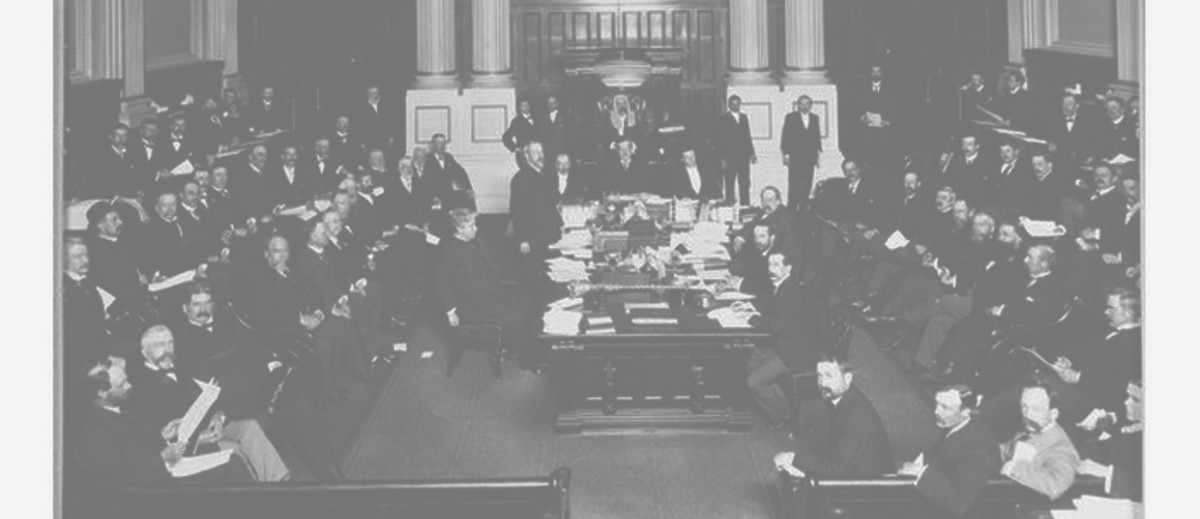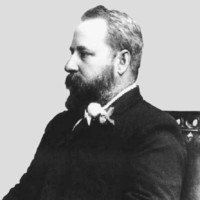Person
ContributePrivy Councillor and Queen’s Counsel, Premier of South Australia from 1893 to 1899 and member of the first Commonwealth ministry in 1901, Charles Cameron Kingston was one of the most significant fathers of Australian Federation, participating in every crucial convention or event from 1887 until 1901, with the exception of the 1890 Melbourne Conference. A radical liberal democrat, he identified strongly with the emerging labour movement, representing the solidly working-class district based in West Adelaide in both state and Federal Parliaments for over twenty-five years.
He was born in Adelaide, South Australia, on 22nd October 1850, the son of George Strickland Kingston and his second wife Ludovina Catherina da Silva (née Cameron). After a prize-winning graduation from school, he was articled as a law clerk and, in 1873, admitted to practice, albeit after the brother of Lucy May McCarthy had unsuccessfully opposed his application on ‘moral’ grounds, accusing Kingston of seducing Lucy.
She and Charles married on 25th June 1873 and remained together, despite numerous later scandals in Kingston’s personal life, including his being named as co-respondent in a society divorce early in his parliamentary career. The scandals never seemed to affect his popularity with his constituents nor impede his political progress, although he was shunned by polite Adelaide society. His more respectable passions included Australian Rules football (he helped to formulate the code of the modern game and was President of the South Adelaide Football Club) and the Volunteer Militia, in which he refused to take a commission, finishing his career, while still Premier, as a sergeant.
In public life he aroused great emotion, his combative and ferocious style often landing him in trouble. Most infamously, in 1892 he challenged Legislative Councillor Richard Baker to a duel. He was arrested in Victoria Square and bound over to keep the peace, only a few months before becoming premier. He was publicly assaulted in the street twice during his premiership, on each occasion getting the best of his assailant by vigorous counter-attack.
Nevertheless his career was productive and successful. In South Australia he promoted much innovative legislation, most of which was subsequently taken up by the new Commonwealth. This included a system of industrial conciliation and arbitration, a universal franchise that included women, protection of wages and working conditions through immigration control (later known as the ‘White Australia policy’) and development of local industry through government enterprise and protective tariffs. He failed in his attempts to democratize the Legislative Council of South Australia but succeeded in achieving a state-wide electorate and universal franchise for the Australian Senate.
Kingston’s greatest cause was Federation. He circulated an influential draft constitution prior to the 1891 Convention and, with Griffith and Barton, prepared the final document on board the steamship Lucinda. When Federation stalled, he drafted the enabling Bill at the Hobart Premiers’ Conference of 1895, providing for a new convention of directly-elected delegates to propose a constitution to be put to a referendum. He topped the poll in the 1897 Convention election. Securing Adelaide as the host city for the first session, he became Convention President, playing an active part in debate and campaigning vigorously in the subsequent referendums. As a member of the delegation in London when the constitution was considered by the Imperial Parliament in 1900, he took a hard line against any changes to the Bill.
He topped the state-wide poll for the House of Representatives in 1901 and was appointed Barton’s Minister for Trade and Customs, resigning from the ministry in 1903. He continued to be returned unopposed as the member for Adelaide until his death on 11th May 1908. Vast crowds stood in the rain to watch his State funeral proceed through the city to West Terrace Cemetery. In 1916 his statue was erected in Victoria Square.
Media
Add mediaImages

Image courtesy of the State Library of South Australia, SLSA: B 1848, Public Domain

South Australian Government Photographic Collection GN03108

Image courtesy of the State Library of South Australia, SLSA: B 72829, Public Domain

Image courtesy of the State Library of South Australia, SLSA: PRG 280/1/8/56, Public Domain



Comments
CommentAdd new comment
Kingston's postnominials show he was a King's Counsel. He was almost denied confirmation of his election to Federal Parliament as a "KC" as it was incorrectly stated that a Queen's Counsel remained such even after the accession of a King. He is correctly The Hon. CC Kingston PC, KC, DoL, MHR as on Lucy's tombstone.